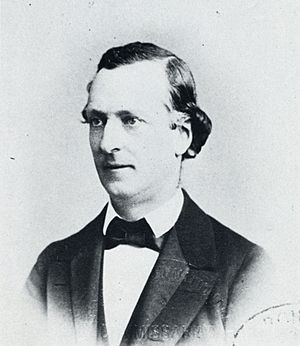Charles-Louis-Étienne Nuitter facts for kids
Quick facts for kids
Charles-Louis-Étienne Nuitter
|
|
|---|---|
 |
|
| Born | 24 April 1828 Paris, France |
| Died | 23 February 1899 (aged 71) Paris, France |
| Occupation |
|
Charles-Louis-Étienne Nuitter (born April 24, 1828, in Paris, France) was a very busy and talented Frenchman. He worked as a librettist (someone who writes the words for operas and ballets), a translator, a writer, and even a librarian. He passed away in Paris on February 23, 1899.
Contents
A Master of Words for the Stage
Charles Nuitter loved the theatre. He first studied law and worked as a lawyer in Paris starting in 1849. But his real passion was writing for the stage.
Writing for Operas and Ballets
In the 1850s, Nuitter began writing librettos. These are the words, or story, for musical shows like operas and ballets. He wrote many different kinds of shows:
- Vaudevilles: These were light, funny plays often with songs.
- Opéras comique: These were operas that included spoken dialogue, not just singing.
- Opéras bouffes: These were a type of comic opera, often very silly and satirical.
- Operettas: These were shorter, lighter operas with spoken parts and catchy tunes.
- Ballets: These are stories told through dance, and Nuitter wrote the story outlines for them.
It's believed that Nuitter wrote or helped write about 500 plays and musical pieces! Around 100 of these were actually performed on stage.
Famous Collaborations
Nuitter worked with many famous composers. He wrote librettos for several works by Jacques Offenbach, a very popular composer of operettas. He also wrote the story for Léo Delibes's famous ballet, Coppélia. This ballet is about a doll that comes to life. Nuitter originally wanted to call it La poupée de Nuremberg (The Nuremberg Doll). He also worked with composers like Hervé, Guiraud, Lalo, and Lecocq.
Translating Operas
Nuitter was also a skilled translator. He helped bring many important German and Italian operas to French audiences. He translated operas by the famous German composer Richard Wagner, including Tannhäuser, Rienzi, Lohengrin, and The Flying Dutchman.
He also translated many operas by the Italian composer Giuseppe Verdi, such as Macbeth, Aida, La forza del destino, and Simon Boccanegra. Both Wagner and Verdi thought Nuitter's translations were excellent. Verdi even asked Nuitter for help when he was revising his opera Don Carlos.
The Paris Opera's Archivist
In 1863, Charles Nuitter started working with the archives of the Paris Opera. These archives are like a giant library and museum for everything related to the opera.
Protecting History
By 1866, Nuitter became the official archivist there. This meant it was his job to organize and protect all the important documents, scores, and records of the opera. He stopped working as a lawyer to focus on this important role.
Nuitter's work was incredibly important. He made sure that old documents were not thrown away. He also bought new, important papers and journals for the collection, sometimes even paying for them himself. For example, he acquired a large collection of theatre books and about 900 opera librettos from a former theatre director.
Growing the Collection
Nuitter helped the Paris Opera's archive grow a lot. In 1861, there were only 350 books and documents. By the end of 1862, there were over 1,000. By 1882, the collection had grown to more than 7,800 items! He made sure that these historical treasures were given a special place when the grand new opera house, the Palais Garnier, opened in 1875.
Selected Stage Works by Nuitter
(Often written with other people)
|
|
 | Emma Amos |
 | Edward Mitchell Bannister |
 | Larry D. Alexander |
 | Ernie Barnes |

